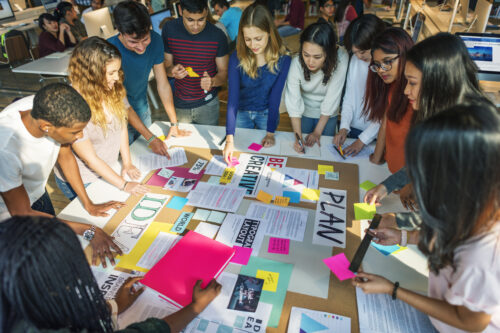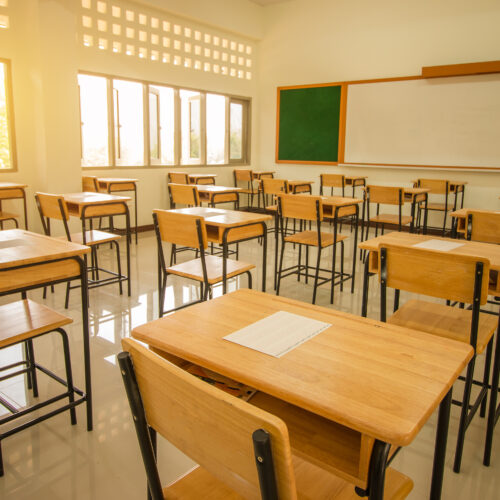
Gone are the days when graduates enter jobs that rely on memorisation or simple thinking. Their working lives will be dynamic and self-motivated. With that in mind, I want to ask, ‘how can school leaders support their students with becoming ready for this world?’
Think back to when you were at school. Topics such as digitalisation, sustainability and global interdependence were not as high on schools’ agendas as they are today. In the same way, employers didn’t focus on recruiting graduates with higher order thinking skills, as activities were more routine – as a result, a skills gap emerges when teachers feel less familiar with the skills they need to develop in their students.
About the author
Jane English is an Education Consultant who has been a Headteacher in UK schools for over 19 years. She is also a Master Trainer for the British Council, operating training all over the world.
What skills will your students need in 2030?
Let’s look ahead five years, when your current cohorts will have left school and be forging their paths in higher education and the workplace. The common question here is: what skills do they need?
It’s a vital question, but I think it needs to go even further. Skills – singular learned abilities – are important by themselves, but they are also pivotal elements of the concept of a ‘competency’. Competence, in short, is a broader ability that includes a combination of skills, knowledge and behaviours. In the workplace, all three elements are equally crucial – and that’s why I think it’s the comprehensive ‘competency’ that education should be aiming to build.
The importance of 21st-century competencies
Global organisations have identified the competencies they believe young people need to have to take their place in the world in which they will live and work in. There’s lots of overlap, but I will use the six identified by the Organisation for Economic Co-Operation and Development (OECD) as my example. These are:
| Cognitive | Problem solving, critical thinking and creative thinking, which are widely regarded as enhancing academic performance and improving outcomes. |
| Interpersonal | Communication, collaboration, leadership and co-operation, which are becoming increasingly important as employees can now communicate across the world instantly. |
| Intrapersonal | Persistence, adaptability, flexibility and initiative. |
| Civic and Citizenship | Intercultural communication and community engagement on both local and international scales. |
| ICT and Digital | Digital literacy and media literacy. |
| Metacognitive | Self-regulated learning, being able to instigate learning when it is appropriate and consideration of how learning takes place. |
If you put these competencies together, you end up with a well-rounded individual who is fully prepared for the challenges of life. The Oxford International Programme calls this ‘future-readiness’, or learners who are competent, critical thinkers, creative, ambitious, good communicators and learn for learning’s sake. In other words, these students have the agency to both take control of their development and keep their wellbeing central to their focus.
What can schools do?
There’s a simple answer which is remarkably difficult to begin implementing: schools should consider reviewing their education offer in response to the world their students will enter. For teachers, this means moving away from traditional classrooms, where students were talked at and made notes purely for exam memorisation – and teachers across the world are already changing how they do things. They’re increasingly focused on developing their questioning techniques and asking students questions that encourage the development of higher-order student thinking and tailoring their lessons to reflect a local context, with tasks that encourage group work and beneficial uses of technology.
However, it also means a change in leadership – where school leaders used to concentrate on administration with limited monitoring of student progress. Instead, school leaders should focus much more on leading teaching and learning – which we now call Instructional Leadership. Studies have shown that school Principals who devote 80% or more of their time to Instructional Leadership have high-performing schools.
Instructional Leadership
Instructional leadership is leadership that focuses on the development of teaching and learning; it devises strategies to improve what happens in the classroom, with a focus on student outcomes. Instructional leaders make the changes to the classroom and the wider student experience to help establish new ways of working that reflect today’s world and ensure teaching and learning provides students not only with the knowledge and global skills they will need to take their place in the world but continuously monitors their progress and develops them throughout their education.
What are the benefits for students?
The key focus of my webinar was how to foster student agency. The term refers to the student having an active role in their learning through voice and choice; it is the capacity to set a goal, reflect and act responsibly to effect change and act rather than being acted upon. Competent students are not passive – they take steps to shape their own learning – and schoolwide cultures that encourage them to make their own choices leave them ready to forge their own path in the future.
It is possible to nurture student agency at any age. The four skills – literacy, numeracy, self-management and self-awareness – are already present in modern teaching and learning at the earliest stage, and as students progress, they develop their perceptions and ability to view these skills in wider contexts. As they grow, they become increasingly familiar with the moral, social, economic and creative contexts in which they live, with the agency they possess enabling them to identify their values, priorities and goals and focus their efforts to achieving them.
For schools, then, promoting student agency through examples and chances for application is key. If you look beyond the classroom and see teaching as an opportunity for students to exercise their voice and make their own choices, they enter their world equipped with all the global skills demanded by the 21st century. And, at the end, their improved outcomes will be evident to all.
Take a look back
On Tuesday 18 March, I led a webinar for the Oxford International Programme on how school leaders should be looking at the style of pedagogy in their classrooms and ensuring global skills for the 21st century are being well taught. I took an in-depth look at the changes needed to bring about a ‘New Normal’, the importance of enhancing learner agency and practical strategies to help integrate this into your school. I also introduced the foundational skills and context for student agency in more detail, as well as advised school leaders on how to take on their role in this ‘New Normal’ for education. After all, learning never stops!



